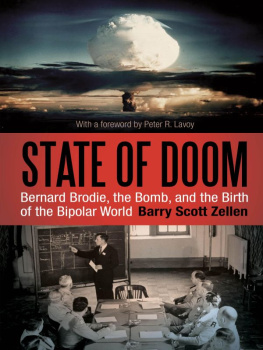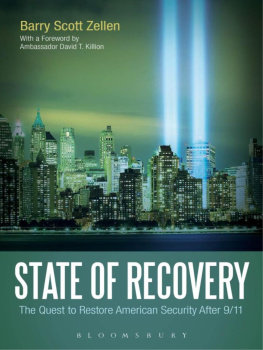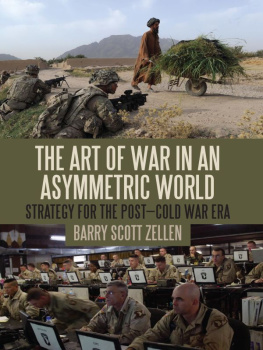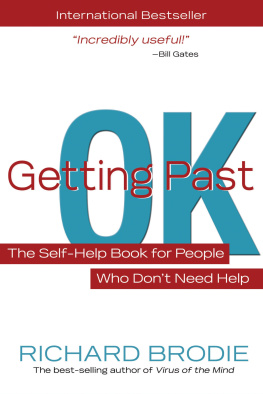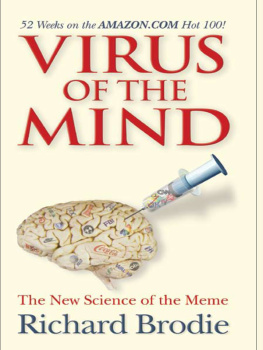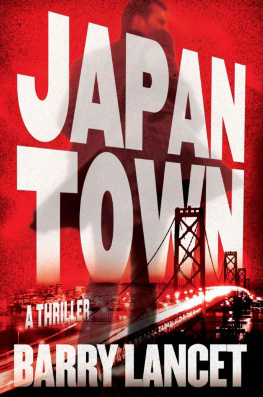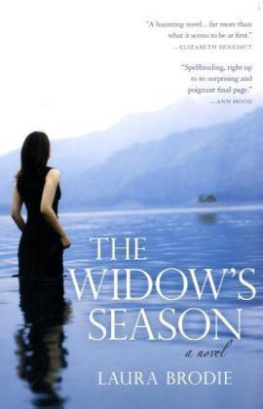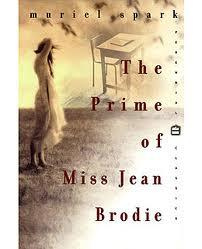2012
Continuum International Publishing Group
80 Maiden Lane, The Tower Building,
New York, 11 York Road, NY 10038 London, SE1 7NX
www.continuumbooks.com
Barry Scott Zellen 2012
All rights reserved. No part of this book may be reproduced, stored in a retrieval system, or transmitted, in any form or by any means, electronic, mechanical, photocopying, recording, or otherwise, without the written permission of the publishers.
Library of Congress Cataloging-in-Publication Data
A catalog record for this book is available from the Library of Congress.
ISBN: 978-1-4411-3337-3
FOREWORD
Rethinking the Unthinkable: Bernard Brodies Continuing Relevance
Peter R. Lavoy
As the Cold War retreats ever further into the past, its bipolar order is increasingly looked back upon with some nostalgia, mainly for its seeming simplicitya world divided by two superpowers whose vast nuclear arsenals induced an unprecedented mutuality of caution in their behavior. So dangerous was this world, so high the cost of strategic miscalculation, that a stable nuclear peace emergedone that many believe was the inevitable outcome of the balance of terror.
With the last decade, defined largely by the global war on terror, globalization, the growth of new military powers, and daunting riddles of asymmetry arising in every region of the world, the clarity and symmetry of the earlier bipolar era can seem preferable to the complexity we now face. But this is a terribly deceptive notion. While it is true that the international system of the Cold War was largely bipolar, at least in terms of military capability and influence, we should not forget how dangerous this era really was, as the two great nuclear-armed rivals stood at the very precipice of an apocalyptic showdown that never came, and all of us living in the shadow of a mushroom cloud.
When the World War II drew to a close, U.S. defense planners were compelled to grapple with a pair of emergent problems, each of which suggested its own solution, but taken together they posed an unprecedented security challenge. First, the enormous destructive power of the newly invented atomic weapon, and the lack of any foreseeable defense against its use, made future wars unthinkable, and thus prompted calls for world government and full military disarmament. The second challenge, the emergence of the Soviet Union as an implacable global adversary, made these schemes unacceptable to U.S. policymakers, and instead stimulated proposals to prolong and exploit Americas nuclear monopoly, and possibly even to launch a preventive war against the Soviet Union before it could acquire its own nuclear arsenal. But these ideas risked turning the budding Cold War into yet another world war.
Recognizing the inevitability of superpower competition, and the likelihood that any conflict between the United States and the Soviet Union would quickly escalate into an unimaginably horrible war fought with the absolute weapon, a group of realist thinkers proposed a novel strategy of nuclear deterrence to bring order to this dangerous predicament. One of the eras greatest thinkers was Bernard Brodie, an innovative theorist of war whose early work was on naval strategy and the effects of technological change on sea power, completed on the eve of World War II just as America took to the high seas to roll back the forces of tyranny from its shores.
As Brodie came to understand, deterrence can be hard to maintain, but it is necessary. It was a constant challenge to implement a strategy that could sustain such a balance between two ideologically opposed, and mutually distrustful, superpowers. Some, like Albert Wohlstetter, came to believe it was at heart a delicate balance. But Brodie disagreed; he saw much reason for hope, especially as the years went by and general war was avoided. For the duration of the Cold War, the United States and the Soviet Union jointly pursued their deterrence policies, and succeeded in avoiding general war, and with it the specter of a true apocalypse.
But there was a great deal of learning that went on, and a lot of close calls along the way, including the Cuban missile crisis, the Berlin crises, as well as two very unpopular limited warsKorea and Vietnamthat were fought for limited objectives and with limited means. The superpowers, aided by a new breed of civilian strategists, like Brodie, gradually improved their deterrence policies as a result of lessons learned from the many crises and conflicts that punctuated the Cold War. Each time they stepped closer to the abyss, they managed again to step back, with the strategists gaining new insights at each critical juncture on how to survive in a nuclear world.
The global system that came to define the Cold War was largely bipolar in structure, especially in terms of strategic military power, but it was not a static system. Instead it was a system that dynamically changed, and over time became increasingly dangerous as weapons technology continued its inexorable advance. As a consequence, the bipolar world was not a simple world by any definition, but was instead a world that was every bit as complex as our world today.
Driving these changes, and increasing the dangers, was an unprecedented surge in scientific knowledgeone that would give birth to not just the atomic age, but also the space age and the digital age. From the first atomic test at Trinity in July 1945, to the first thermonuclear explosion at Bikini Atoll in November 1952, to the emergence of the international continental ballistic missile (ICBM) in 1957, and later the multiple independently targetable re-entry vehicle (MIRV) in 1970, technology continued to accelerate and with it the destructiveness, speed and accuracy of these new, unimaginably lethal weapons. Because of this increasing lethality, Brodie would remain firm in his belief that general war between the nuclear powers must never be fought. He recognized this as early as 1946, when he wrote in The Absolute Weapon what became one of his best known precepts for the nuclear age: Thus far the chief purpose of our military establishment has been to win wars. From now on its chief purpose must be to avert them. It can have almost no other useful purpose.
In Brodies time, the vertical proliferation of nuclear weapons by the superpowers posed the greatest dangerand it was this challenge he focused on. Although this threat diminished substantially with the demise of the Soviet Union and end of the Cold War, Brodies contributions on deterrence, escalation, nuclear targeting, limited war, and related strategic concepts are worth reacquainting ourselves with, because Russia and China are now modernizing their nuclear arsenals and associated delivery systems, and thus we are entering a new phase in strategic nuclear competition.
Deterrence theory also has relevance to the new set of states that have joined or are trying to break into the nuclear club. In 1969, when the Nuclear Non-Proliferation Treaty was signed, only five countries possessed nuclear weapons: the United States, the Soviet Union, China, France, and Great Britain. Later, Israel, South Africa, India, Pakistan, and North Korea developed their own nuclear weapons capabilities. Driving this continued horizontal proliferationat the pace of one or two new nuclear nations each decadehas been a mutuality of insecurity by states that face dangerous external threats. Some countries pursue nuclear weapons not to offset a nuclear threat, but rather to offset a conventional military threat. For example, India started its nuclear bomb program in the aftermath of war with China, and then accelerated this effort when China conducted its first nuclear explosive test in 1964. Pakistan launched its nuclear weapons program after losing to India in the 1971 war over East Pakistan (now Bangladesh) and stepped it up after India tested its first nuclear explosive device in 1974. And now Iran points to an alleged Israeli nuclear threat to justify its own attempt to develop the technology and materials needed to produce nuclear weapons. So, as a result of the persistence of insecurity to so many states, nuclear weapons continue to have appeal.

